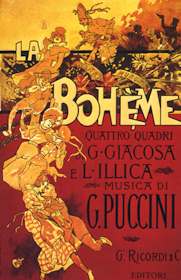|
La Bohème ECENE LIRICHE IN FOUR QUADRI This is the first fruit of the collaboration between Puccini, Giacosa and Illica. At first, his colleague, Leoncavallo, offered him the libretto, but Puccini, probably thinking that it couldn't be good enough, declined it, and suggested that he set it to music himself. That was exactly what Leoncavallo did, and this led Puccini to decide to compose the opera after all. Although Puccini had a comfortable life at Torre del Lago, and enjoyed the companionship of his friends in the village - they founded the "Club la Bohème" - the composer worked as quickly as his librettists did. The opera was premiered before Leoncavallo's. Although Puccini preferred a more famous conductor, he accepted Ricordi's recommendation of a young musical director of the Teatro Regio, Arturo Toscanini. The premiere was a success, but not so great as "Manon Lescaut". The critics gave this opera a cool reception. Nevertheless, the public took to La Bohème more and more enthusiastically with each performance and finally the maestro triumphed with the production in Palermo. This opera was acclaimed in the biggest theatres of the world within two years, even if it took a few seasons longer to become established in Vienna. Gustav Mahler, who had just joined the Vienna Court Opera as conductor, was sent to Venice in May 1897 to hear the world premiere of Leoncavallo’s and a performance of Puccini’s Bohème. He reported back to the director of the opera that Puccini’s version was by far the better of the two works ("One measure of Puccini is worth more than all of Leoncavallo"), however director Jahn was on good terms with Leoncavallo and had already decided to produce Leoncavallo’s version. After Mahler took over as director of the Court Opera, he produced Puccini’s Bohème in 1903. |
||
|
|||
|
|||
|
|||
Location: Paris; Time: 1830 |
|||
|
|||
| PROTAGONISTS
|
Mimì
(soprano) Rodolfo, a poet (tenor) Marcello, a painter (baritone) Musetta (soprano) Colline, a philosopher (bass) Schaunard, a musician (baritone) Bénoit, landlord (bass) Parpignol, a toy-seller (tenor) Alcindoro, a Councillor (bass) a customs officer (bass) a sergeant (bass) Students, Townspeople, Working girls, Travelling salesmen, Waiters, Children |
||
|
|||
| PREMIÈRE |
Teatro
Regio, Turin, February 1st 1896 Mimì:
Cesira Ferrani |
||
|
|||
| INSTRUMENTATION | Picc, 2 Fl, 2 Ob, Eng hn, 2 Cl,
BCl, 2 Bn, 4 Hn, 3 Tpt, 3 Tbn, BTbn, Timp, Trg, Tamb, glasses, T-T, GC, Cymb, Xyl, Car,
Cmp, Harp, Strings; on stage: 4 pipes (Picc), 6 Tpt, 6 Dr. |
||
| CHORUS |
|
||
| SYNOPSIS | ACT I: in a rooftop garret
in Paris, where Rodolfo, a poet, and Marcello, a painter, are at work on Christmas Eve.
Both are hungry and cold. Rodolfo decides to burn his play manuscript in the stove to
provide heat. The philosopher Colline arrives after trying in vain to pawn some books.
Schaunard, a musician, enters with food, wine and fuel. Benoit, the landlord, interrupts
their celebration by arriving to ask for the rent. They ply him with wine and then, by a
ruse, bundle him out. All go off to the Café Momus, but Rodolfo stays behind to finish
writing an article. Mimi, a neighbor, knocks on the door to ask for a light for her
candle. Because of wind, both their candles are blown out and they have to search for the
key in the darkness. Rodolfo touches Mimi's hand. They fall in love and go off to the
Café Momus together. ACT II: Crowds gather outside the Café. Rodolfo arrives with Mimi, who is introduced with mock formality. Musetta enters with rich and elderly Alcindoro, and they take a table near the Bohemians. She tries to attract the attention of Marcello, her former lover. When Marcello's resistance is worn down, she capriciously sends Alcindoro off on an errand and departs with the Bohemians, leaving the bill for Alcindoro to pay. ACT III: At Barrière d'Enfer, one of the gates of Paris, on a cold dawn the following winter. Mimi has came to talk to Marcello who lives there with Musetta. She complains of Rodolfo's acute jealousy. When Rodolfo appears, she hides close by and overhears the true reason for his behavior: Rodolfo knows that she is dangerously ill and can't help her because of his poverty, so he prefers for Mimi to be with someone who can take care of her. Mimi is struck by a coughing spell and they embrace and decide to spend one more winter together. Marcelo and Musetta quarrel and she leaves him again. ACT IV: Again in the garret, Marcelo and Rodolfo try to work and to forget their former lovers, in vain. Schaunard and Colline came in with provisions for supper and the Bohemians eat and drink with comic solemnity, dance and embark on a duel with tongs and shovel. Musetta interrupts the joyful scene and informs them that Mimi is outside, dying, and wants to see Rodolfo for the last time. Mimi is helped inside and placed in a bed. She remembers the love they shared, as her coughing becomes more and more intense. The others gradually return and realize that Mimi has died. Rodolfo flings himself on the bed, sobbing over her lifeless body. |
||
|
|||
| LIBRETTO | ACT I | ||
| ACT II | |||
| ACT III | |||
| ACT IV | |||
| DISCOGRAPHY | |||
| OPERA IN VIDEO AND DVD | |||
